Newcastle United : 1898-1960
Newcastle United was formed in 1892 after the merger of two local clubs, Newcastle East End and Newcastle West End. The following season Newcastle was elected to the Second Division of the Football League. The team performed extremely well and finished in fourth place with only seven defeats in 28 league games.
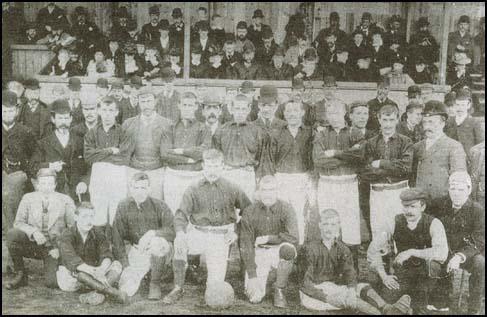
In 1895 Newcastle appointed Frank Watt as club secretary. He immediately went to Scotland and began recruiting high-quality players. His first two signings were Andy Aitkin and Willie Wardrope.
John Peddie signed for Newcastle United in 1897. In his first full season he was top scorer with 16 league goals and helped the club win promotion to the First Division. Peddie was also top scorer in 1898-99 (18), 1899-1900 (15) and 1900-01 (16). However, as Paul Joannou points out in his book, The Black 'n' White Alphabet: "Peddie... was often in trouble with the club's hierarchy for a number of misdemeanours; refusing to play, being absent from training and ultimately being suspended sine-die in 1900 (later lifted)."
Over a four year period he scored 73 goals in 125 matches. However, a local newspaper report pointed out that the fans had mixed views on his abilities: "Peddie is the most highly praised and roundly abused man on the club's books. A player of moods... his nonchalant ways and easy going methods are less inspiring than his shooting."
Matt Kingsley joined Newcastle United in 1898. He became the club's regular goalkeeper. Paul Joannou argues that "Matt was noted for his fisted clearances in the style of the day, and also for a habit of continually swinging his arms to and fro as he was waiting for the action. Somewhat hefty at 14 stones." Kingsley won his first international cap for England against Wales on 18th March 1901. He was the first Newcastle United player to represent his country.
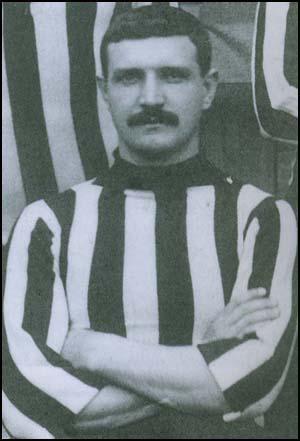
Matt Kingsley lost his place in the team to Jim Lawrence in the 1904-05 season. Kingsley, who had played 189 league and cup games for the club, was transferred to West Ham United.
Newcastle United won the Football League championship in the 1904-05 season. The club also reached the FA Cup Final that year but was beaten by Aston Villa 2-0. The attendance of 101,117 remains the largest crowd to watch Newcastle play. Newcastle also got to the 1906 FA Cup Final. However, this time they were beaten by Everton 1-0.
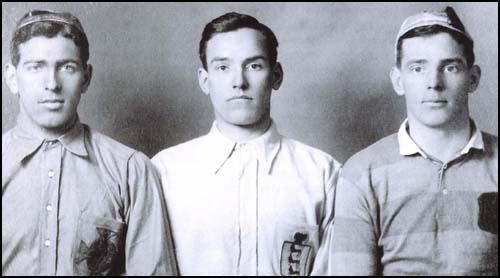
Newcastle United also won the First Division championships in the 1906-07 and 1908-09 seasons. They also won the FA Cup Final against Barnsley in 1910. The following season they finished in third place in the First Division behind Blackburn Rovers and Everton.
Stan Seymour was transferred to Newcastle United for a fee of £2,500 in 1920. He established himself as the first-team's outside left and in his first season scored 9 goals in 30 games. The club finished in 5th place in the First Division. However, it was not until the signing of Hughie Gallacher for £6,500 in 1925, that Newcastle began to challenge for the championship. Gallacher made an immediate impact and during his first season scored 23 goals in 19 games. The following season Newcastle won the First Division league title. Gallacher, who had been made captain of the side, scored 36 goals in 38 league games.
Newcastle reached the FA Cup Final in 1924 after beating Portsmouth (4-2), Derby County (5-3), Watford (1-0), Liverpool (1-0) and Manchester City (2-0). Stan Seymour had scored four goals in the cup run. He also scored one of the goals in Newcastle's 2-0 victory over Aston Villa.
However, it was not until the signing of Hughie Gallacher for £6,500 in 1925, that Newcastle United began to challenge for the championship. Gallacher made an immediate impact and during his first season scored 23 goals in 19 games. The following season Newcastle won the First Division league title. Gallacher, who had been made captain of the side, scored 36 goals in 38 league games.
Newcastle United was less successful in the next three seasons but each year Gallacher was the clubs's top scorer: 1927-28 (21 in 32), 1928-29 (24 in 33) and 1929-30 (29 in 38). As Paul Joannou points out in The Black 'n' White Alphabet: "Hughie Gallacher is considered by many to be the greatest centre-forward of all time. Although a mere 5' 5", he was a handful for any defence possessing awesome strike power. Hughie could shoot with either foot, dribble with the ball, head, tackle, forage and also frequently lose his control on the field. A record of netting a formidable total of 463 goals in 624 senior matches speaks for itself, while Gallacher is United's most potent attacker of all time with a strike-rate of over 82% in his 174 outings."
In 1930 Andy Cunningham was appointed as the club's new manager. Newcastle only had moderate form in the league but in the 1931-32 season they beat Blackpool (1-0), Southport (9-0), Leicester City (3-1), Watford (5-0) and Chelsea (2-1) to reach the final against Arsenal at Wembley Stadium.
Arsenal scored first, eleven minutes after the start, when Bob John headed in a centre by Joe Hulme. Just before half-time Jimmy Richardson chased what appeared to be a lost cause, when David Davidson sent a long ball up the right wing. When the ball appeared to bounce over the line, the Arsenal defence instinctively relaxed. Richardson managed to hook the ball into the middle and Jack Allen was able to head home. Despite the protests, the referee W. P. Harper, awarded the goal. David Jack missed an easy chance midway through the second-half and soon afterwards Allen scored again to win the game for Newcastle United 2-1.
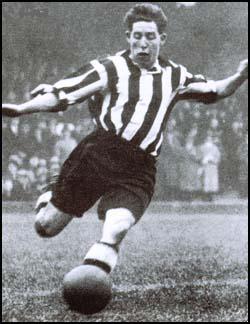
Newcastle United finished in 21st place in the 1933-34 season and the club was relegated into the Second Division. Despite this humiliation, Andy Cunningham, the manager, kept his job. However, after only finishing 6th in the first season in the Second Division, he was replaced by Tom Mather, the former manager of Bolton Wanderers.
In 1938 Stan Seymour joined the board of Newcastle United. The following year he became the manager of the club. In 1943, Newcastle gave a trial to the 19 year old Jackie Milburn. In a game at St James Park Milburn scored six goals after coming on for the regular Newcastle centre-forward, Albert Stubbins. After the game Seymour told Milburn that if he signed for the club he would go straight into the first team.
At the beginning of the 1946-47 season Seymour sold Albert Stubbins to Liverpool. In October 1946 he signed Len Shackleton for a record fee of £13,000. He joined a forward line that included Tommy Walker, Jackie Milburn, Ernie Taylor and Charlie Wayman. Shackleton made his debut for his new club against Newport County on 5th October. He scored six goals in the record 13-0 win.
It was hoped that Newcastle United would get promotion to the First Division that season. However, they only finished in 5th place. The average home gate was 56,350, the largest in the world. Newcastle did much better in the FA Cup and reached the semi-final where they were beaten by Charlton Athletic 4-0.
In March 1947 George Martin became the new manager. He decided to switch Jackie Milburn to centre-forward in a game against Bury. The move was a great success and Milburn scored a hat-trick. He continued in this position for the rest of the season. The following month Newcastle United gained promotion to the First Division by beating Sheffield Wednesday 4-2 in front of 66,483 spectators at St. James Park. Milburn was the star of the side, scoring 20 goals in 39 league games. As Paul Joannou points out in The Black 'n' White Alphabet: "He had devastating pace and a lethal shot in either foot. Jackie was especially remembered for his ability to swivel in tight situations to power a drive towards the net... Milburn could join expertly in approach play, and possessed tremendous ball control running at speed, as well as a marvellous sliding tackle that took the ball from opponents."
Not everyone appreciated the skills of Len Shackleton. His captain, Joe Harvey, argued that Shackleton was developing into a crowd entertainer rather than a team footballer and seemed more interested in beating four or five men than passing the ball to a better positioned team-mate. He added that "Newcastle would never win anything with him in the team". In February 1948 George Martin sold Shackleton to Sunderland in the First Division for the record fee of £20,050. Eight months later Martin used this money to buy Alf McMichael and George Hannah from Linfield.
Stan Seymour returned as manager in December 1950. Newcastle United finished 4th in the 1950-51 season. Once again Jackie Milburn was top scorer with 17 goals in 31 league games. George Robledo was also in great form with 14 goals in 38 appearances.
Newcastle United also enjoyed a good FA Cup run beating Bolton Wanderers (3-2), Stoke City (4-2), Bristol Rovers (3-1) and Wolverhampton Wanderers (2-1) to reach the final against Blackpool. The defences were in control in the first-half. The deadlock was broken in the 50th minute when Milburn collected a pass from George Robledo to fire home. Five minutes later, Ernie Taylor cleverly back-heeled the ball and Milburn scored with a powerful shot. As Milburn later recalled: "I struck it with all my might and from 28 yards it flew straight as an arrow into the back of the net." The game ended 2-0 and Newcastle had won the cup.
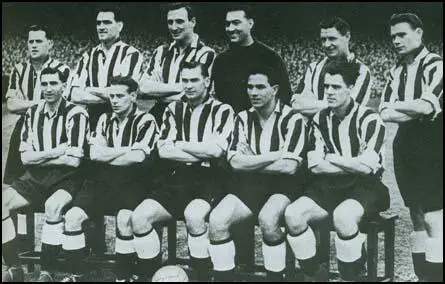
Newcastle United finished in 8th place in the 1951-52 season. This was their lowest position since promotion in 1948. George Robledo was top scorer with 33 goals in 39 league games. Other scorers included Jackie Milburn (25 in 32) and Bobby Mitchell (9 in 30).
Newcastle had another good FA Cup run in the 1951-52 season, beating Aston Villa (4-2), Tottenham Hotspur (3-0), Swansea City (1-0), Portsmouth (4-2), Blackburn Rovers (2-1) to reach the final against Arsenal. The London club had finished 3rd in the First Division championship and were the post-match favourites.
In the 19th minute Wally Barnes was injured in a tackle with Jackie Milburn. He tried to carry on but he was forced to leave the field in the 35 minute. Arsenal's ten men fought magnificently against the marauding Newcastle forwards. They held out until the 85th minute when George Robledo headed in a Milburn cross. Newcastle had become the first team to retain the FA Cup since Blackburn Rovers in 1891.
In June 1953, Stan Seymour, the manager of Newcastle United, paid £22,250 for Jimmy Scoular. Appointed captain, he was a great success at Newcastle. As Paul Joannou points out in The Black 'n' White Alphabet: "He was as tough as they come, but also possessed dainty skills and the expert passing ability to send a perfect 40 yard cross field pass." Scoular joined a talented team that included Jackie Milburn, Bobby Cowell, Vic Keeble, Frank Brennan, Alf McMichael, Tommy Walker, Bob Stokoe, Ronnie Simpson, Bobby Mitchell, George Hannah, Vic Keeble and Len White.
In 1954 Jackie Milburn was moved to outside-right and Vic Keeble was given the number 9 shirt. As Paul Joannou points out in The Black 'n' White Alphabet: "A persistent leader, not pretty to watch yet certainly effective, who often took a battering from defenders". Kebble was a magnificent header of the ball. A journalist once commented that Keeble "would even take a penalty with his head." Keeble scored 15 goals in 28 league and cup games in the 1954-55 season. However, his flick-ons, made plenty of chances for his fellow forwards. This included goals for Bobby Mitchell (23), Jackie Milburn (21), Len White (16) and George Hannah (13).
Newcastle also had a good FA Cup run in the 1954-55 season, beating Plymouth Argyle (1-0), Brentford (3-2), Nottingham Forest (2-1), Huddersfield Town (2-0), York City (2-0) to reach the final against Manchester City. Newcastle's star player, Jackie Milburn, later recalled how the game started: "I won a corner on the right and Len White ran over to take it. Manchester City's captain, Roy Paul, was standing next to me as Len placed the ball, but he suddenly yelled, 'Bloody hell, I should be marking Keeble,' so off he darted to find big Vic, who was more widely noted for his prowess in the air. Len fired the ball in my direction and there was I standing all alone like Grey's Monument. I headed the ball past their keeper, Bert Trautmann and that was it."
The situation got worse for City when Jimmy Meadows suffered a serious knee injury in the 18th minute. Just as in 1952 Newcastle had just ten men to beat. Despite this disadvantage City equalized when Bobby Johnstone beat Ronnie Simpson with a diving header after good work from Joe Hayes.
In the second-half Newcastle United made their numerical advantage count. According to Jackie Milburn, the Newcastle captain, Jimmy Scoular, was the best player on the pitch: "Scoular kept spraying great crossfield balls to Bobby Mitchell and between them they tore City apart." Charlie Buchan later commented: "I have never previously seen a wing-half display as good as that of Scoular's in any big game."
In the 53rd minute Bobby Mitchell made a run down the wing before scoring from an acute angle. Vic Keeble later pointed out: "We were completely in control. Mitch forced Trautmann into a great save, but we were not to be denied and on the hour, Jimmy (Scoular) intercepted a City pass before crossing 40 yards over Spurdle's head for Mitch to control and square for George Hannah to fire home from 12 yards." The goal scored by George Hannah made in 3-1 and Newcastle United had won the FA Cup for the third time in five years.
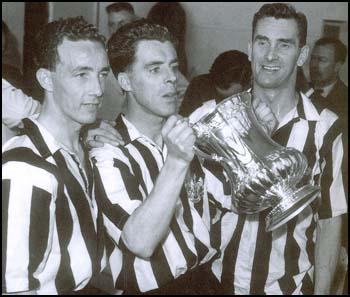
After the FA Cup Final victory in 1955 the Newcastle United team began to break-up. In September 1957 George Hannah was sold to Lincoln City. The Rock of Tyneside, Frank Brennan, left in March 1956 after a dispute with the management. Bobby Cowell was badly injured during a friendly in Germany during a summer tour in 1955 and was forced to retire from the game.
Jackie Milburn also lost his form at this time. Jack Charlton played against Milburn in the 1956-57 season. "I had a good game against him. I got to the ball first and thought, he's not as quick as he used to be. I tackled him a couple of times and he fell down." In 1957 Milburn decided to leave the club.
Vic Keeble suffered from a long-term back injury and he was eventually transferred to West Ham United in October 1957. He had two good seasons with his new club before being forced into retirement at the age of 29.
Ronnie Simpson suffered a serious muscle injury that kept him out of the side for the whole of the 1958-59 season. He played in only three games the following season and in October 1960 he was sold to Glasgow Celtic for £3,000.
In January 1961, Jimmy Scoular, Newcastle's captain, joined Bradford Park Avenue as player manager. Later that year Bobby Mitchell and Bob Stokoe also left the club. Alf McMichael, who had played 427 games for the club, left soon afterwards.
Primary Sources
(1) Jackie Milburn, Jackie Milburn's Newcastle United Scrapbook (1981)
The big boss was Stan Seymour, who was always reminding us about how he'd won the Cup in 1924 and, as all footballers will tell you, there's nothing more galling than the gaffer going on about success in his day. But he was crafty, was Stan, and he knew what would egg us on. It certainly worked!
Stan knew soccer inside out and had a knack for collecting talent. What's more, he handled the players marvellously. We might have been paupers in comparison with today's stars but we were treated like kings. Everything was first-class with Newcastle United, and everyone knew it. We had our own special carriage attached to the back of the train when we travelled away and our own chef to prepare our food. Special training at either Blackpool, Brighton or Buxton was a feature of our Cup years because Seymour believed the best way to know each other was to live together. Besides, we were paid an extra £2 a day spending money and we looked forward to that.
We were all men to Stan, not little boys. Joe Harvey believed that a couple of pints of Guinness On a Saturday morning were good for him so he was allowed to have them.. Often on a Friday night Stan would stride up to the hotel bar and buy Ernie Taylor a pint, with little Ernie hardly able to see over the top of the counter. It was all above board and in moderation which is better than having players sneak round the corner for a bevvy. No fewer than nine of our team smoked and on three occasions at Wembley in a Cup final I've sat at half-time having a fag. Doing what comes naturally relaxed us and brought out the best results.
(2) Vic Keeble, Match of My Life (2007)
We were just about favourites but could not have dreamt of a better start. Jimmy Schoular combined with Jackie and Len White and immediately won a corner. We took up our positions and caught City cold because Roy Paul was marking me. Jackie was unmarked at the near post to head home Len's cross. Less than a minute gone and 1-0 ahead, it was amazing.
City almost equalised but Joe Hayes sliced wide an opportunity created by Paul and Revie. Mitch then hit the bar direct from a corner and then Trautmann made a brilliant stop from a Hayes shot that Paul deflected towards his own goal. We were on top and soon got an unfortunate assist when City full-back Jimmy Meadows departed on 20 minutes with ligament damage after he fell awkwardly when Mitch dummied his way past him. No substitutes were allowed so City were down to 10 men. You had to feel for them because no team likes to see this happen, especially in a cup final. It made their task really difficult. Bill Spurdle moved to defence and they played with four forwards.
Revie, Barnes and Johnstone worked hard, but we dominated although had a scare when Len picked up an ankle injury but was fine to continue. Chances came our way, but we failed to take them. Jimmy was left frustrated when Dave Ewing headed an effort off the line, Len saw a shot brilliantly saved by Trautmann after George Hannah and Mitch combined, then 10 minutes from half time I headed a cross from point-blank range towards goal but Trautmann clawed the ball clear. It was a great save but I should have scored.
City battled away and you have to give them credit. They created openings on the break, Hayes went close and, to our surprise, equalised on the stroke of half time through Johnstone. Revie and Barnes were involved in the build up before Hayes set up the Scot to head home from 10 yards. We were disappointed to let a goal in so late in the half but I fancied our chances as City would tire on the wide Wembley pitch.
In the dressing room, Stan Seymour said, "Stay in the middle, don't drift to the wing. Jimmy will supply Mitch, and Mitch will pick Revie up and tear them to ribbons." I pulled defenders away a bit and it worked a treat. Hayes gave us an early fright with a snap shot but space was opening up and our second goal came on 53 minutes when Mitch controlled White's centre, turned Spurdle, and caught Trautmann out by firing home from a tight angle instead of crossing the ball.
We were completely in control. Mitch forced Trautmann into a great save, but we were not to be denied and on the hour, Jimmy intercepted a City pass before crossing 40 yards over Spurdle's head for Mitch to control and square for George Hannah to fire home from 12 yards.
I knew that we had won the Cup; it was a tremendous feeling and before full-time, we could have had a fourth but Trautmann saved again from Mitch and I headed over when well placed. There was no way back for City. At the final whistle, there was total elation. We were dancing around the pitch. Collecting our medals was fantastic; I was so thrilled and George said to me he would be at the front of every picture, he was!
(3) Jack Milburn, Jackie Milburn: A Man of Two Halves (2003)
As a footballer, Dad had always given his best for Newcastle United and the supporters, but not once, from the third-round tie to the semi-final, did he think the team were good enough to reach Wembley itself. "The old zest and power which had been such a feature of past Cup triumphs just was not with us. We rarely had a settled team and with some of the old stars disappearing, to be succeeded nearly every week by new faces, no fewer than 17 different players helped Newcastle along the Wembley trail. Now, having helped them to Wembley once more, I, like my colleagues, wondered whether or not I'd get into the team for the match of the season. In previous years, Stan Seymour had assured us that the side that did well in the earlier rounds would represent the club at Wembley, but Livingstone never gave any of us that assurance."
After the stomach-muscle injury he'd been plagued with all season flared up again, Dad found himself sidelined and cursed his bad luck. Even though he had played in every previous cup-tie, the forward line of White, Davies, Keeble, Hannah and Mitchell were knitting together so well, that Dad now genuinely feared for a place. However, once fit enough to play again, he thankfully found himself thrown another lifeline as Livingstone shunted him from centre-forward to inside-forward, then out to the wing, until finally, just three weeks before the final, he was told to concentrate on the role of centre-forward. Now he knew only too well how brilliantly Vic Keeble was playing in that position, so deep down Dad expected the worst; however, once more he was given a swift reprieve when inside-left George Hannah suffered an injury and Dad was told to adopt that position for the next League match. He was left with a slender ray of hope.
By now, most of the other players were fed up with being mucked about by Livingstone and not having a clue as to their Wembley fate, so after a tactical team talk at the County Hotel in Newcastle prior to the final mid-week League game, they insisted on being told the final Wembley line up. Livingstone reluctantly agreed, and so left the room to speak with the directors in an adjacent room, himself returning an apparently very unhappy chap just a short while later. He blurted out the selected names, but then stated categorically that the final selection was certainly not of his own personal choosing. Dad "sighed with relief when my name was read out, though felt extremely sorry for Len White, whose place I had secured".
It was not until after the Cup final itself that Dad discovered had it been left up to Livingstone alone, he, beyond a shadow of a doubt, would not have played. An irate, grim-faced Stan Seymour, who had led the "Newcastle don't play in Cup finals without Jackie Milburn" campaign, had ripped up and chucked Livingstone's selection into the waste bin.
"I'm glad I didn't know at the time of Livingstone's plans to drop me, as it would have left a deep mental scar and done nothing to help my inferiority complex."
Soon after, Livingstone was relegated from his big office to a tiny space formerly used as the referee's changing room, before eventually being sacked in 1956.
